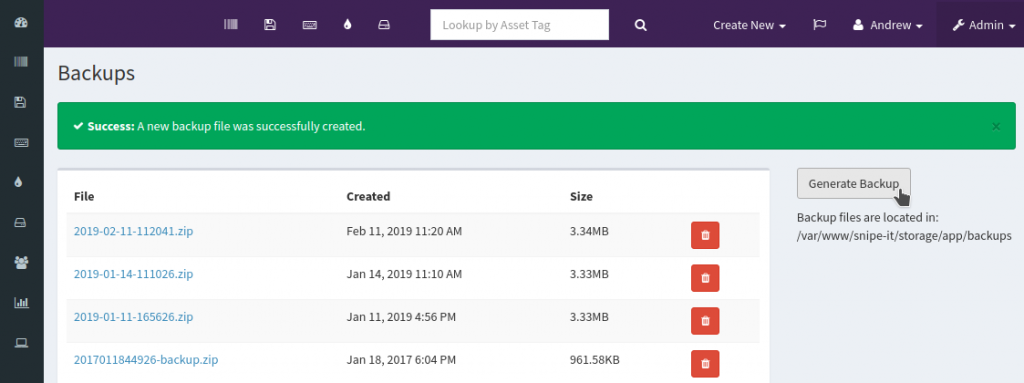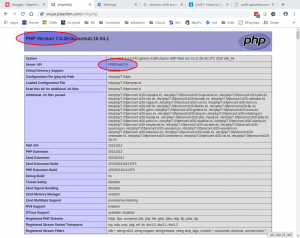Recently I was tasked with upgrading an old Snipe instance. Below are the details of what we are going from, to.
| Current | Target |
|---|---|
| Ubuntu 14.04 Snipe v3.6.3 Apache (mod_php) PHP 5.5.9 |
Ubuntu 16.04 Snipe v4.6.8 Apache PHP-FPM PHP 7.0.32 |
Backup
Before proceeding – make sure you take a backup in case anything goes wrong! My instance is running on OpenStack so I’ve also taken an image just to be extra safe.
Database
To backup the database, the easiest way is via the web interface. Login and navigate to Admin --> Backups --> Generate Backup.
These are stored in /var/www/snipe-it/storage/app/backups/.
apike@ops1:~$ ls -ltr /var/www/snipe-it/storage/app/backups/ total 19604 -rw-r--r-- 1 www-data www-data 984660 Jan 18 2017 2017011844926-backup.zip -rw-r--r-- 1 www-data www-data 1030611 Jan 19 2017 2017-01-19-102154.zip -rw-r--r-- 1 www-data www-data 2153957 Feb 24 2017 2017-02-24-170215.zip -rw-r--r-- 1 www-data www-data 2691364 Aug 14 2017 2017-08-14-095054.zip -rw-r--r-- 1 www-data www-data 2705729 Nov 2 2017 2017-11-02-172750.zip -rw-r--r-- 1 www-data www-data 3494571 Jan 11 16:56 2019-01-11-165626.zip -rw-r--r-- 1 www-data www-data 3494630 Jan 14 11:10 2019-01-14-111026.zip -rw-r--r-- 1 www-data www-data 3501061 Feb 11 11:20 2019-02-11-112041.zip
You may want to copy this somewhere for safe keeping.
apike@ops1:~$ sudo cp -v /var/www/snipe-it/storage/app/backups/2019-02-11-112041.zip ~ '/var/www/snipe-it/storage/app/backups/2019-02-11-112041.zip' -> '/home/apike/2019-02-11-112041.zip'
Website
To backup the website, make a copy of the installation directory.
apike@ops1:~$ cd /var/www/ apike@ops1:/var/www$ sudo mkdir snipe-it-backup apike@ops1:/var/www$ sudo cp -R snipe-it/ snipe-it-backup/ apike@ops1:/var/www$
Update Operating System
Lets start by updating the OS. For convenience, I switch to the root user here.
apike@ops1:~$ sudo -i root@ops1:~# apt update root@ops1:~# apt dist-upgrade root@ops1:~# reboot
I also remove some old kernel boot entries and reboot again.
root@ops1:~# apt-get autoremove root@ops1:~# reboot
Do Release Upgrade
Assuming the upgrade went okay – lets do a release upgrade from 14.04 to 16.04.
root@ops1:~# do-release-upgrade
Prompt:
Reading cache Checking package manager Continue running under SSH? This session appears to be running under ssh. It is not recommended to perform a upgrade over ssh currently because in case of failure it is harder to recover. If you continue, an additional ssh daemon will be started at port '1022'. Do you want to continue? Continue [yN] y
Press enter:
Starting additional sshd To make recovery in case of failure easier, an additional sshd will be started on port '1022'. If anything goes wrong with the running ssh you can still connect to the additional one. If you run a firewall, you may need to temporarily open this port. As this is potentially dangerous it's not done automatically. You can open the port with e.g.: 'iptables -I INPUT -p tcp --dport 1022 -j ACCEPT' To continue please press [ENTER]
Confirm:
... Fetched 4442 kB in 0s (0 B/s) Reading package lists... Done Building dependency tree Reading state information... Done Building data structures... Done Updating repository information Third party sources disabled Some third party entries in your sources.list were disabled. You can re-enable them after the upgrade with the 'software-properties' tool or your package manager. To continue please press [ENTER]
Start the upgrade:
... Do you want to start the upgrade? 15 installed packages are no longer supported by Canonical. You can still get support from the community. 36 packages are going to be removed. 222 new packages are going to be installed. 707 packages are going to be upgraded. You have to download a total of 584 M. This download will take about 2 minutes with your connection. Installing the upgrade can take several hours. Once the download has finished, the process cannot be canceled. Continue [yN] Details [d]y
Confirm Yes to the sysstat warning.
Agree:
My answer:
Configuration file '/etc/default/rcS'
==> Modified (by you or by a script) since installation.
==> Package distributor has shipped an updated version.
What would you like to do about it ? Your options are:
Y or I : install the package maintainer's version
N or O : keep your currently-installed version
D : show the differences between the versions
Z : start a shell to examine the situation
The default action is to keep your current version.
*** rcS (Y/I/N/O/D/Z) [default=N] ? Y
Anser Yes.
Configuration file '/etc/apache2/sites-available/default-ssl.conf'
==> Modified (by you or by a script) since installation.
==> Package distributor has shipped an updated version.
What would you like to do about it ? Your options are:
Y or I : install the package maintainer's version
N or O : keep your currently-installed version
D : show the differences between the versions
Z : start a shell to examine the situation
The default action is to keep your current version.
*** default-ssl.conf (Y/I/N/O/D/Z) [default=N] ? Y
Keep the currently installed version of ssh_config.
Configuration file '/etc/ssh/ssh_config'
==> Modified (by you or by a script) since installation.
==> Package distributor has shipped an updated version.
What would you like to do about it ? Your options are:
Y or I : install the package maintainer's version
N or O : keep your currently-installed version
D : show the differences between the versions
Z : start a shell to examine the situation
The default action is to keep your current version.
*** ssh_config (Y/I/N/O/D/Z) [default=N] ? N
Install package maintainer’s version:
Configuration file '/etc/pam.d/sshd'
==> Modified (by you or by a script) since installation.
==> Package distributor has shipped an updated version.
What would you like to do about it ? Your options are:
Y or I : install the package maintainer's version
N or O : keep your currently-installed version
D : show the differences between the versions
Z : start a shell to examine the situation
The default action is to keep your current version.
*** sshd (Y/I/N/O/D/Z) [default=N] ? Y
Package maintainers:
Package maintainers:
Configuration file '/etc/cloud/cloud.cfg'
==> Modified (by you or by a script) since installation.
==> Package distributor has shipped an updated version.
What would you like to do about it ? Your options are:
Y or I : install the package maintainer's version
N or O : keep your currently-installed version
D : show the differences between the versions
Z : start a shell to examine the situation
The default action is to keep your current version.
*** cloud.cfg (Y/I/N/O/D/Z) [default=N] ? Y
Lastly, delete all packages no longer required:
... Searching for obsolete software Reading package lists... Done Building dependency tree Reading state information... Done Building data structures... Done Building data structures... Done Remove obsolete packages? 105 packages are going to be removed. Removing the packages can take several hours. Continue [yN] Details [d]Y
Once that completes, issue a reboot to make sure we don’t any any major issues.
... Processing triggers for man-db (2.7.5-1) ... Processing triggers for dbus (1.10.6-1ubuntu3.3) ... Processing triggers for libc-bin (2.23-0ubuntu10) ... Processing triggers for gconf2 (3.2.6-3ubuntu6) ... Processing triggers for ruby (1:2.3.0+1) ... System upgrade is complete. Restart required To finish the upgrade, a restart is required. If you select 'y' the system will be restarted. Continue [yN] Y
Hopefully that came backup up. Assuming it did, check the reported distro:
root@ops1:~# lsb_release -a No LSB modules are available. Distributor ID: Ubuntu Description: Ubuntu 16.04.5 LTS Release: 16.04 Codename: xenial
Fix PHP
It is unlikely your instance of Snipe still works. If it does – happy days! Else we likely need to fix a few issues. In order to upgrade Snipe, we need to issue some commands as the same user that’s serving PHP. In our case that is www-data. Rather than run PHP as the Apache user, I will install and configure PHP-FPM and run the site under its own user.
You should hopefully now have the latest version of PHP:
root@ops1:~# php -v
PHP 7.0.32-0ubuntu0.16.04.1 (cli) ( NTS )
Copyright (c) 1997-2017 The PHP Group
Zend Engine v3.0.0, Copyright (c) 1998-2017 Zend Technologies
with Zend OPcache v7.0.32-0ubuntu0.16.04.1, Copyright (c) 1999-2017, by Zend Technologies
PHP-FPM
First lets install PHP-FPM and the required modules.
root@ops1:~# apt install libapache2-mod-fastcgi php7.0-fpm php7.0 php7.0-zip php7.0-mbstring php7.0-xml php7.0-bcmath php7.0-ldap php7.0-mysql php7.0-curl php7.0-gd
Enable modules:
root@ops1:~# a2enmod actions fastcgi alias root@ops1:~# systemctl restart apache2.service
Open the configuration for the vhost:
root@ops1:~# vim /etc/apache2/sites-enabled/snipe.conf
And add the following section.
<Directory /usr/lib/cgi-bin>
Require all granted
</Directory>
<IfModule mod_fastcgi.c>
AddHandler php7-fcgi .php
Action php7-fcgi /php7-fcgi virtual
Alias /php7-fcgi /usr/lib/cgi-bin/php7-fcgi
FastCgiExternalServer /usr/lib/cgi-bin/php7-fcgi -socket /var/run/php/php7.0-fpm.sock -pass-header Authorization
</IfModule>
My full configuration looks like this:
<VirtualHost *:80>
ServerAdmin [email protected]
ServerName snipe.pikedom.com
DocumentRoot /var/www/snipe-it/public
<Directory /var/www/snipe-it/public>
AllowOverride All
#Order allow,deny
#allow from all
Require all granted
</Directory>
ScriptAlias /cgi-bin/ "/var/www/cgi-bin/"
<Directory /var/www/cgi-bin>
AddHandler cgi-script .cgi
Options +FollowSymLinks +ExecCGI
</Directory>
RewriteEngine on
RewriteCond %{SERVER_NAME} =op1.pikedom.com
RewriteRule ^ https://%{SERVER_NAME}%{REQUEST_URI} [END,QSA,R=permanent]
<Directory /usr/lib/cgi-bin>
Require all granted
</Directory>
<IfModule mod_fastcgi.c>
AddHandler php7-fcgi .php
Action php7-fcgi /php7-fcgi virtual
Alias /php7-fcgi /usr/lib/cgi-bin/php7-fcgi
FastCgiExternalServer /usr/lib/cgi-bin/php7-fcgi -socket /var/run/php/php7.0-fpm.sock -pass-header Authorization
</IfModule>
CustomLog ${APACHE_LOG_DIR}/snipe.com-access.log combined
</VirtualHost>
Create Snipe User
Create a new user Snipe and PHP will run under.
root@ops1:~# groupadd snipe root@ops1:~# useradd -g snipe snipe root@ops1:~# passwd snipe
Configure Pool
Edit the below file….
root@ops1:~# vim /etc/php/7.0/fpm/pool.d/www.conf
…and change the user and group to snipe. Ignoring all the clutter, your configuration file should now look as follows:
root@ops1:~# egrep -v "^$|^[[:space:]]*$|^;" /etc/php/7.0/fpm/pool.d/www.conf [www] user = snipe group = snipe listen = /run/php/php7.0-fpm.sock listen.owner = www-data listen.group = www-data pm = dynamic pm.max_children = 5 pm.start_servers = 2 pm.min_spare_servers = 1 pm.max_spare_servers = 3
File Permissions
The permissions should be correct, we just need to change the owner from www-date to snipe.
root@ops1:~# cd /var/www/ root@ops1:/var/www# chown -vR snipe:www-data snipe-it/
Restart and Test PHP
Although Snipe is probably still not working, if all went well, PHP 7.0 should now being served via PHP-FPM. To test, first restart both Apache and PHP-FPM:
root@ops1:~# systemctl restart apache2.service php7.0-fpm.service root@ops1:~#
Now test by creating a info.php test file. See this guide for more information. All being well, you should see something like this:
Don’t forget to remove the file once done:
root@ops1:~# rm -v /var/www/snipe-it/public/info.php
Upgrade Snipe
Now everything is up-to-date and the latest version of PHP is running as the snipe user, upgrading Snipe should hopefully just be a simple case of following the official documentation below:
https://snipe-it.readme.io/docs/upgrading
https://snipe-it.readme.io/v4.0/docs/upgrading-to-v4
Switch to the snipe user.
root@ops1:~# su - snipe Creating directory '/home/snipe'.
Put Snipe-IT into maintenance mode
snipe@ops1:~$ cd /var/www/snipe-it/ snipe@ops1:/var/www/snipe-it$ php artisan down Application is now in maintenance mode.
Remove old cache files
snipe@ops1:/var/www/snipe-it$ rm -v bootstrap/cache/config.php rm: cannot remove 'bootstrap/cache/config.php': No such file or directory snipe@ops1:/var/www/snipe-it$ rm -v bootstrap/cache/services.php removed 'bootstrap/cache/services.php' snipe@ops1:/var/www/snipe-it$ rm -v bootstrap/cache/compiled.php removed 'bootstrap/cache/compiled.php'
And then run the following:
snipe@ops1:/var/www/snipe-it$ ./composer.phar dump Generating autoload files snipe@ops1:/var/www/snipe-it$ php artisan cache:clear Cache cleared successfully. snipe@ops1:/var/www/snipe-it$ php artisan view:clear Compiled views cleared! snipe@ops1:/var/www/snipe-it$ php artisan config:clear Configuration cache cleared!
Download/clone the new release
snipe@ops1:/var/www/snipe-it$ git pull
For me, this resulted in an error:
... * [new tag] v4.6.7 -> v4.6.7 * [new tag] v4.6.8 -> v4.6.8 Updating 7b1d2ee..6d82896 error: Your local changes to the following files would be overwritten by merge: app/Models/Ldap.php Please, commit your changes or stash them before you can merge. Aborting
Which I resolved by moving the problem file out the way.
snipe@ops1:/var/www/snipe-it$ mv -v app/Models/Ldap.php ~ 'app/Models/Ldap.php' -> '/home/snipe/Ldap.php'
And then re-ran:
snipe@ops1:/var/www/snipe-it$ git pull
Update dependencies
snipe@ops1:/var/www/snipe-it$ php composer.phar install --no-dev --prefer-source snipe@ops1:/var/www/snipe-it$ php composer.phar dump-autoload
Configure
Configure .env if required.
snipe@ops1:/var/www/snipe-it$ vim .env
Migrate Database
snipe@ops1:/var/www/snipe-it$ php artisan migrate
Bring site out of maintenance mode
snipe@ops1:/var/www/snipe-it$ php artisan up
And that should be it! Hopefully your site is back online!?! If not, try running an upgrade.php.
snipe@ops1:/var/www/snipe-it$ php upgrade.php
Again, if still not working, make sure you have restarted Apache and PHP-FPM (as the root user):
root@ops1:~# systemctl restart apache2.service php7.0-fpm.service
When trying to access your sites URL, make sure you have cleared your local browsing cache.





Be the first to comment